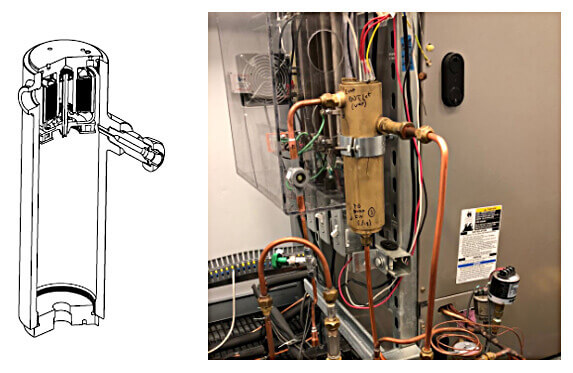February 25, 2020
Turbomachine expander offers efficient, safe strategy for heating, cooling
 Purdue University researchers created a turbomachine expander that offers an efficient and safe strategy for heating and cooling. (Image provided)
Purdue University researchers created a turbomachine expander that offers an efficient and safe strategy for heating and cooling. (Image provided)
WEST LAFAYETTE, Ind. – A new device to help homeowners cut electricity bills also could provide more efficient and safer cooling options for companies and vehicles.
Purdue University researchers developed their device to decrease energy consumption of the vapor-compression heat pump cycle, which is commonly used in homes, businesses and vehicles for cooling and heating.
The team created a novel turbomachine expander that helps harvest previously wasted energy used in the process of moving the air from high to low pressure. The device can be used as a control agent within an existing heat pump. The team’s work is presented in the International Journal of Refrigeration.
“Our solution packs a twofold punch in that it’s more efficient but still just as safe as conventional vapor-compression heat pump cycle operations,” said Riley Barta, a graduate research assistant in Purdue’s College of Engineering. “We created a device that’s the best of both worlds with a fixed nozzle and variable options for phase separation that allow a much broader range of applications than are possible with more conventional approaches.”
The other members of the Purdue team are Eckhard Groll, the Reilly Professor of Mechanical Engineering and director of the Office of Professional Practice, and David Ziviani, a research assistant professor of engineering.
“Not only does our device help cut down wasted energy, which helps reduce electricity costs and improve efficiency, but it works across a range of ambient conditions,” Barta said. “Our expander and control method ensure the safe operation of the heat pump system.”
The Purdue device can be used with any common heating and cooling systems found in homes, vehicles and industrial buildings.
The innovators are working with the Purdue Research Foundation Office of Technology Commercialization to patent the technology. The office recently moved into the Convergence Center for Innovation and Collaboration in Discovery Park District, located on the west side of the Purdue campus.
The researchers are looking for partners to continue developing their technology. For more information on licensing and other opportunities, contact Dhananjay Sewak of OTC at dsewak@prf.org and mention track code 2020-GROL-68846.
About Purdue Research Foundation Office of Technology Commercialization
The Purdue Research Foundation Office of Technology Commercialization operates one of the most comprehensive technology transfer programs among leading research universities in the U.S. Services provided by this office support the economic development initiatives of Purdue University and benefit the university's academic activities through commercializing, licensing and protecting Purdue intellectual property. The office is managed by the Purdue Research Foundation, which received the 2019 Innovation and Economic Prosperity Universities Award for Place from the Association of Public and Land-grant Universities. The Purdue Research Foundation is a private, nonprofit foundation created to advance the mission of Purdue University. Visit the Office of Technology Commercialization for more information.
Writer: Chris Adam, 765-588-3341, cladam@prf.org
Source: Riley Barta, bartar@purdue.edu
Abstract
Experimental Analyses of Different Control Strategies of an R-410A Split-System Heat Pump by Employing a Turbomachinery Expansion Recovery Device
Riley B. Barta, Davide Ziviani and Eckhard A.Groll
With increasing need for energy efficient vapor-compression cycles (VCCs), researchers have investigated different aspects of such systems to increase performance. The goal of this research is to experimentally investigate the design and control of a turbomachine expander to recover work and control the VCC. An R-410A split-system heat pump experimental setup has been utilized to compare the performance and control capabilities of a variable nozzle and a fixed nozzle with phase separation combined with evaporator bypass flow metering. A theoretical analysis on the benefit of the expander in heat pumps motivated heat pump operation in cooling mode. The variable nozzle experiments yielded a significant decrease in expander isentropic efficiency, and the evaporator bypass control led to an increase in system coefficient of performance (COP) of 2.3% with an expander overall isentropic efficiency of 18.8%. Compressor suction superheat control was achieved with the evaporator bypass over a range of ambient conditions.

